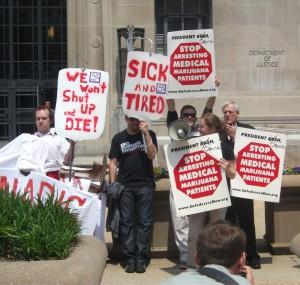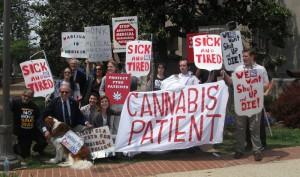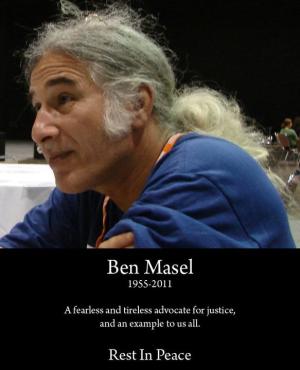Federal prosecutors are threatening elected officials in states considering regulating medical marijuana dispensaries. It's working, so far.
The Montana legislature has passed a medical marijuana reform bill that is "repeal in disguise," according to advocates. The governor is also unhappy with it. He has ten days to veto it, but says he will let it become law.
There are no dispensaries or patient and provider registries left in the Washington medical marijuana dispensary and patient and provider registry bill after Gov. Gregoire took her veto pen to it.
Ohio insurance magnate Peter Lewis has given millions for drug reform efforts across the country. Now, he'd like to see medical marijuana come to his home state.
New York City Mayor Michael Bloomberg started to talk sense about drug legalization, but quickly fumbled. Meanwhile his police officers are arresting thousands of marijuana users -- in a city that has decriminalization!
A sweeping review of New Zealand's drug laws is calling for steps toward medical marijuana, decriminalization of drug possession and small-time dealing, and doing away with drug paraphernalia laws. Not too bad.
Wisconsin marijuana activist, First Amendment supporter, and gadfly to the establishment Ben Masel has died of lung cancer at age 56.
April was the deadliest month so far in Mexico's prohibition-related violence, with authorities reporting 1,402 killings.
Perverted probation officers, greedy jail guards, and a perjury plot backfires.
Was it an attempted rip-off of prospective dope and gun buyers? Hard to say, but one man is dead after undercover narcs and the people they were there to bust got into a gunfight.
Events and quotes of note from this week's drug policy events of years past.
While DEA raids on medical marijuana providers never came to a complete halt after the Obama administration declared in 2009 that it would not interfere with people operating in compliance with state medical marijuana laws, the pace did slacken. But now, the raids are on the increase -- there have been at least 90 DEA SWAT-style raids since Obama took office -- and the federal government has unveiled an ominous new weapon in its war on the weed: US attorneys in a number of medical marijuana states sending letters to politicians threatening dire consequences, even the potential arrest of state employees, if states okay schemes to tolerate and regulate medical marijuana distribution.

Rally in Sacramento Monday for Dr. Mollie Fry and Dale Schafer. (Image courtesy ASA)
Threatening letters from US attorneys have been sent to officials in Arizona,
California,
Colorado,
Hawaii,
Montana,
Rhode Island, and
Washington. The first was in February in California; the latest came this week in Arizona.
What is worse is that the interventions by the US attorneys appear deliberately timed to intimidate elected officials as they consider regulating medical marijuana dispensaries -- and it seems to be working. Last week, Washington Gov. Chris Gregoire vetoed a bill that would have created a regulated dispensary system after requesting and receiving a threatening letter from her state's two US attorneys. This week, Rhode Island Gov. Lincoln Chafee "placed a hold" on dispensaries about to open there after receiving an unsolicited threatening letter from the US attorney.
Earlier, as Montana legislators debated whether to regulate and allow dispensaries there, the feds hit them with a one-two punch of DEA raids and a US attorney letter. While Gov. Brian Schweitzer vetoed a bill that would have repealed the state's medical marijuana law, all indications are that he will not veto a bill that will effectively kill dispensaries in Big Sky Country. And in Hawaii, legislators backed away from a dispensary bill after receiving similar threats.
The medical marijuana community has responded with protests -- there were actions in cities across the country on Monday -- but appears uncertain about what to do next. There are calls to reschedule marijuana, including one by Washington Gov. Gregoire, there are calls for the Obama administration or Congress to do something, and there are calls on state elected and appointed officials to stand firm in the face of federal bullying.
A group of Washington state legislators has also responded by sending a letter asking the state's Attorney General for his legal opinion on the law. The 15 legislators, all Democrats, led by Rep. Roger Goodman (Kirkland), asked Attorney General Rob McKenna if state employees had anything to fear from federal law enforcement if the vetoed state licensing provisions of the bill were revived, according to the
Kitsap Sun.
A
cannabis rescheduling petition to change marijuana's status under the Controlled Substances Act has been pending since 2002. Perhaps if Gregoire can rally other governors behind her, they can light a fire under the feds.

Rally in Washington, DC Monday to demand an end to federal interfence. (Image courtesy ASA)
In the meantime, the raids continue. The DEA hit a San Diego dispensary Tuesday.
"This turn of events with the US attorneys is troublesome and reactionary," said Dale Gieringer, the long-time head of
California NORML, who had just returned from a Sacramento rally in support of Dr. Mollie Fry and her companion, Dale Schafer, who had that day begun serving five-year federal prison sentences for medical marijuana cultivation. "It makes your head spin about that Obama policy of low enforcement, but Obama never said he supports states having access, and the US attorneys have taken matters into their own hands. This is certainly disappointing."
"It's very disconcerting and alarming that the federal government is deciding to deal with the medical marijuana issue this way," said Kris Hermes, a spokesman for
Americans for Safe Access (ASA), the nation's largest medical marijuana defense organization. "We had been seeing progress, with states passing distribution laws, others amending their laws to include distribution, and others passing new laws to incorporate distribution into the laws they passed. It's very unsettling that the federal government is choosing to interfere in the implementation of those laws and restrict the access that patients could benefit from or are benefiting from."
ASA recently gave the Obama administration
a failing grade on its approach to medical marijuana. That report card cited continuing law enforcement actions against medical marijuana providers. It is unclear whether the recent US attorney letters represent a policy shift at the Justice Department or whether individual prosecutors are taking the initiative. The Justice Department did not respond to a Chronicle call for clarification. Still, it is clear that the federal prosecutors are on a mission.
"When the Rhode Island US attorney made the threat he did, without being asked, that signified that this is more than just a defensive policy, it is an aggressive policy on the part of the US attorneys to keep medical marijuana illegal," said Gieringer.
"We'd like to know what's going on," said Hermes. "The federal government is showing its cards now. This is drawing attention to the fact that it didn't necessarily mean what it said when it said it wouldn't use Department of Justice resources to circumvent state laws. It certainly seems like there is a concerted effort in the background, but no one has come out from Justice and said that. Justice has refused to meet with patient advocates since this increased interference in the past few months, and they need to address this community and this issue. They can't say one thing in a policy statement and do the exact opposite. The spotlight is on the president at this point."
"The federal government has totally ignored us on all fronts," said Geiringer, "but we're just going to have to keep insisting that we be heard. I would like to see somebody in Congress question this on the record. It never gets mentioned in congressional hearings when DEA officials are up there; it's just totally ignored."
"The timing of these memos really smacks of intimidation and interference," said Morgan Fox, communications director for the
Marijuana Policy Project (MPP). "Our advice for lawmakers is to stand their ground and do what's best for their states, particularly when it comes to the feds prosecuting state employees involved in registries. There has never been a prosecution; it doesn’t rise to the level of aiding and abetting."
"They've never moved against any public official for this stuff anywhere, so I think this is an empty threat," agreed Gieringer, "but public officials being what they are, they are easily cowed."
Elected and appointed officials at the state level need to stand firm against the federal threats, said Fox. "The US attorney memos are frightening and starting to get more severe in tone, but all we need to do is have the states considering dispensary regulation to continue moving ahead with that. I don't think the feds are going to push this too much. They don't have the resources, and it would be a policy disaster for the administration."
If the threats to go after state officials are over-hyped, the dangers to dispensary operators are not. One was convicted in Spokane as legislators deliberated, and more than a dozen were raided in Montana as the legislature took up medical marijuana bills. They are all looking at lengthy federal prison sentences if prosecuted and convicted.

Patients rally across the country for medical marijuana. (Image courtesy ASA)
"It's not lawmakers who will be looking at five-year federal prison sentences, but dispensary operators. They have to make personal decisions about whether they want to take that risk. Opening dispensaries is not just a way to provide safe access for patients, but also an act of civil disobedience, and you could face consequences," warned MPP's Fox.
ASA is holding training sessions for dispensary operators, said Hermes. But operators also need to continue to organize and pressure their elected representatives, he said.
But if the feds are standing firm, so is the medical marijuana movement. ASA, MPP, and California NORML all pledged to continue the fight.
"This is the federal government's last shot to try to prevent something that is working well in the US and will continue to work as long as the federal government stays out of the business of implementing state laws," said Hermes. "More than that, the federal government should be working with states to design a comprehensive federal policy that includes disengagement from enforcement and investment in research and rescheduling marijuana so that patients are protected wherever they live."
"We will continue to try to shine a light on this absurd and obscene misuse of law enforcement," said Gieringer, again pointing to the case of Dr. Fry and Dale Schafer. "Dale is on anti-hemophilia drugs with one treatment costing $10,000. He's also on morphine. And they're sending him to prison for five years? That's just crazy, but the machine just keeps going."
"We are just on the cusp of being legitimate and are now being beat back," said Fox. "We have to hold our ground."
back to top
Montana Gov. Brian Schweitzer already vetoed a medical marijuana repeal bill this session, and now, medical marijuana advocates are calling on him to repeal a bill that won final passage in the legislature last Thursday, a bill they call "repeal in disguise."
But it's unlikely they will get their wish. Schweitzer held a press conference last Friday saying he would neither veto nor sign the bill, thus allowing it to pass into law without his signature.
"So I will hold my nose and allow this to be law until the Legislature gets back to session (in 2013)," he said. "I'm not going to sign it. I guess I could veto it. I could say that this is a danged-poor bill, and you started out with a good bill (from an interim committee), and you went downhill for almost 88 days. But I'm kind of painted in a corner. They painted Montana in a corner. They accepted some of the language that I believe makes the bill constitutional. So that is good. Is the bill perfect? Not even close. But can I veto and allow the Wild West go on for the next couple of years? I don't think so."

Gov. Schweitzer wielded the veto ax once this session to protect medical marijuana, but declined the second time.
The legislation,
Senate Bill 423, was originally designed to regulate Montana's burgeoning medical marijuana industry, but was heavily amended in the legislative process and now contains provisions unacceptable to medical marijuana advocates. The governor also has serious problems with it. He called it "unconstitutional on its face" earlier this week.
Advocates say the bill, the work of the Republican leadership in the state legislature, now seeks not to regulate but to cripple Montana's medical marijuana program. Among other provisions designed to hobble medical marijuana, the bill calls for providers to be limited to growing for three patients and to receive no compensation -- not even the repayment of expenses incurred -- for their efforts. Providers could produce smokable marijuana or edibles, but not both.
The bill also requires that law enforcement be notified of a person's status as a medical marijuana patient and, if the patients grows his own medicine, allows for his grow to be inspected by law enforcement at any time. It requires that patients seeking relief for chronic pain, the most common ailment for which medical marijuana is recommended, undergo two separate physician exams.
The bill restricts physicians to writing recommendations for no more than 15 patients per year. Physicians who write more than 15 recommendations would be subject to investigation by the state medical board -- at their own expense. The bill also bans laboratories that test medical marijuana for safety, content, and quality control reasons.
"We came to the 2011 session seeking to work constructively with legislators, law enforcement and numerous civic groups to develop smart regulations that would close loopholes, end abuses, and create a strictly regulated program that would serve legitimate patients and meet the needs of law enforcement and local community values," said a broad coalition of Montana medical marijuana organizations in a joint statement after the bill's initial passage Tuesday.
"Unfortunately, the legislature roundly rejected a number of bipartisan proposals that had strong support from all concerned. Ultimately, the views of physicians and patients were dismissed and the opinions of growers with a unique knowledge of the challenges involved in growing medical-grade cannabis were ignored. Instead of ending up with workable but rigorous oversight, we've been given a prospective wasteland, with the very best of what has emerged over the past few years potentially outlawed by the legislature. This deliberately unworkable repeal in disguise deserves a veto brand as much as the repeal bill did," the groups said.
The groups signing onto the statement included
Patients & Families United, the
Montana Medical Growers Association,
Solutions for Montana,
Alliance for Cannabis Science,
Montana Botanical Analysis,
Cannabanalysis Laboratories,
Citizens for Cannabis Comprehension,
Montana Connect and
Montana NORML.
"SB 423 is written to fail patients, not to fulfill compassionate voter intent in ways that also will work well for law enforcement and communities," the groups argued. "We call on Gov. Schweitzer to veto the bill and instead to aggressively use administrative authorities under the existing law to create effective regulation."
Gov. Schweitzer had similar issues with the bill as passed Tuesday, and on Thursday, he sent a
letter to the legislature outlining amendments that would make it acceptable to him. Those include:
- Increase the number of cardholders for whom medical marijuana providers or manufacturers may provide products, from the three to 25 people.
"I believe SB423 makes access to medical marijuana far too difficult for patients, many of whom are suffering chronic and severe illness and do not have the physical or financial ability to grow their own marijuana to treat their debilitating condition," Schweitzer said. "Patients must be able to obtain medical marijuana from legitimate sources with a reliable product." But the 25-patient limit will "prevent the large grow operations that boomed under the current law."
- Remove the restriction on providers from making a profit for providing medical pot or marijuana products.
"My amendments do allow a provider to charge for their plant products and lift the no-profit restriction from the bill," he said.
- Allow a provider to be both a grower and manufacturer of marijuana-infused products.
"There has been no testimony that this now common practice has been a problem," he said.
- Increase the number of patients that a physician could recommend medical marijuana before triggering a review by the state Board of Medical Examiners.
The bill puts the number at 15; Schweitzer recommended increasing that to 50, which, he said, "will still certainly curtail the number of cardholders."
- Require two physicians, rather than one, for a minor to be certified to be treated with medical marijuana in an edible form or topical cream.
- Revise the bill to address constitutional problems concerning the medical marijuana patient's privacy.
"The blanket disclosure requirement in the bill would never survive the strict scrutiny stand for invading a patient's right to privacy," he said."Handing over a list of cardholders to law enforcement is unfair to vulnerable patients who legitimately qualify for a card," he said. "I fear it would drive those patients to the illegal market for marijuana."
- Change the bill so as not to allow law enforcement unlimited access, without permission or warrant, to the private homes of cardholders who grow their own marijuana.
"Patients who grow their own plants were not the genesis of any of the problems that arose under the current law and should not now be subject to warrantless searches," Schweitzer said. "If law enforcement officers believe a patient is diverting their marijuana or growing beyond the allowed limits, they should properly investigate the matter, gain access through consent or through a search warrant."
- Transfer the revising authority for approving a new medical condition for eligibility for medical marijuana treatment from the Legislature to the Department of Public Health and Human Services.
- Provide for "a more rational transition time" for providers to register and comply with the new law. He would make new effective date for some provisions Oct. 1 and for others July 1.
- Require providers who grow and manufacture marijuana products to register their location with the Department of Public Health and Human Services.
- Give the department rule-making authority to enable cardholders to receive a list of medical pot providers in a particular area.
"Given that SB423 prohibits advertising and storefronts may be prohibited by local jurisdictions, it is essential patients are able to find a provider," Schweitzer said.
- Give the Department of Public Health and Human Service authority to adopt rules regarding the transportation, possession of samples and testing and labeling of marijuana by laboratories around Montana.
But the legislature wasn't listening. While it did agree to remove the provision turning cardholders' names over to law enforcement and it agreed that providers could produce both buds and edibles, it kept the number of patients caregivers could serve at three and it kept the provision barring any compensation to medical marijuana providers, effectively gutting the state's emergent dispensary system.
"I don't believe the voters in 2004 voted to establish a regulated industry," said bill author Sen. Jeff Essman (R-Billings). "I believe we have taken a great step forward if we pass this bill today. I believe this allows truly ill individuals reasonable access, and I do believe reasonable access will be here," says Essmann.
The medical marijuana community disagrees, and had been counting on Schweitzer to come through with a veto. But now there are only a couple of days left to get him to change his mind. The decision is now Gov. Schweitzer's, and the clock is ticking.
back to top
Washington Gov. Chris Gregoire Friday vetoed large parts of a medical marijuana bill that would have created a state-wide patient and provider registry and a state-licensed and regulated dispensary system, citing the potential threat to state workers who could be prosecuted under federal law. Gregoire's partial veto eliminated the dispensary and registry provisions, leaving little left of Senate Bill 4073 but a reiteration of existing affirmative defenses for patients and providers.

Gregoire chooses militarization over regulation
In her
veto statement, Gov. Gregoire said that the dispensary licensing and regulation provisions "would direct employees of the state departments of Health and Agriculture to authorize and license commercial businesses that produce, process or dispense cannabis. These sections would open public employees to federal prosecution, and the United States Attorneys have made it clear that state law would not provide these individuals safe harbor from federal prosecution. No state employee should be required to violate federal criminal law in order to fulfill duties under state law. For these reasons, I have vetoed" the relevant sections.
She also vetoed language that would require owners of housing to allow medical marijuana use on their property because it "put them in potential conflict with federal law." And she vetoed reciprocity language allowing nonresidents to use while in Washington because it "would not require these other state or territorial laws to meet the same standards for health care professional authorization required by Washington law."
Gregoire's veto pen also killed language that would have allowed people on probation or parole to use medical marijuana with a court's approval. "The correction agency or department responsible for the person's supervision is in the best position to evaluate an individual's circumstances and medical use of cannabis," she explained.
Gregoire said she vetoed the statewide patient and provider registration provisions because "they are intertwined with requirements for registration of licensed commercial producers, possessors, and dispensers of cannabis" and would thus leave state employees still facing the threat of federal prosecution.
"I am not vetoing Sections 402 or 406, which establish affirmative defenses for a qualifying patient or designated provider who is not registered with the registry," which she vetoed. That and provisions allowing for scientific study of medical marijuana, protecting the parental rights of patients, and barring discrimination in housing or organ transplants are about all that's left of what was supposed to be Washington's dispensary bill.
Gregoire signaled in mid-month that she was leery of federal prosecution of state employees, citing letters from the state's two US attorneys warning that state employees who licensed or regulated large-scale commercial marijuana operations would not be immune from prosecution under the Controlled Substances Act.
Bill sponsor Sen. Jeanne Kohl-Welles (D-Seattle) said she was disappointed but not surprised by Gregoire's action. "I think the potential for federal arrest and prosecution of state employees is extremely improbable," Kohl-Welles told the
Seattle Post-Intelligencer after the governor's partial veto. "I think that the patients are the most important consideration."
Kohl-Welles said she was working on a new bill for the legislature's current special session, one that would not involve state employees. "Gregoire does not want to have state workers included at all," Kohl-Welles said. "We have to find out what can be done without their involvement."
The ACLU of Washington sent Gregoire a
letter Thursday urging her to sign the bill unaltered and suggesting her fear for state employees was unwarranted. "The federal government has never prosecuted state employees involved in implementing a state-adopted medical marijuana law, and it will not do so in Washington," the letter said. "Empty threats by the federal government should not be used as justifîcation for refusing to sign legislation that will aid suffering residents, as well as local governments, of Washington."
But that's just what Gov. Gregoire did with the veto pen last Friday.
back to top
Cleveland-based billionaire Peter Lewis, the chairman of Progressive Insurance, wants Ohioans to vote on becoming a medical marijuana state. Through his attorney, he has put out a request for proposals for an Ohio medical marijuana initiative that will "create a model for future campaigns in other states."

Could Ohio be next? Peter Lewis would like to make it happen. (Image via Wikimedia.org)
Lewis has given millions of dollars to drug reform campaigns across the country, including $900,000 last year to the
Marijuana Policy Project and another $200,000 for Proposition 19 in California. Now, his drug reform funding is channeled through his attorney, Graham Boyd of the
ACLU Drug Law Reform Project.
Ohio "stands out as having particularly high levels of voter support," the request said. It seeks proposals that include drafting ballot language, qualifying for the ballot, building a campaign organization, communicating with voters, and raising money -- although it is probably safe to assume Lewis would kick in a substantial sum himself.
But it's not a done deal yet. "You shouldn't take it as a given that there will be a ballot initiative this campaign," said Boyd told
Forbes on Tuesday. "But we want to see proposals."
Lewis's interest in marijuana reform is personal. He was arrested for pot and hash possession in New Zealand in 2000, but got the charges dropped by making a generous donation to a local drug treatment center.
Fifteen states and the District of Columbia have legalized the use of marijuana for medical purposes, but only one of them, Michigan, is in the Midwest. In Michigan, it won through a voter initiative; if someone is on the ball in the Buckeye State, Ohio could be next.
back to top
In a radio interview on WOR-AM last week, New York City Mayor Michael Bloomberg unexpectedly brought up the subject of drug legalization. Responding to a question about medical marijuana tweeted by a listener, Bloomberg seemed to realize he was stumbling into a minefield. "I'm sort of reticent to bring it up," he said, "What's up with medical marijuana in NYC," he continued, reading the question aloud. "Is it going to be okay soon? Need to know by this weekend," he read, inspiring mayoral laughter.

Mike Bloomberg
"We don't allow medical marijuana in this state," he replied. "They do in California…"
Then, apparently very much in the moment, Bloomberg turned from medical marijuana to drug legalization: "The argument is that the only way you're going to end the drug trade is to legalize drugs and take away the profit motive," he said. "And that the corruption funds enormous dislocations, like Mexico, where thousands or tens of thousands of people have been killed in the wars where the government tried to crack down on the drug dealers..."
Good start! Mayor Bloomberg, uncharacteristically for a prominent mainstream US politician, had articulated two of the core arguments made by legalization advocates. But then, perhaps realizing where he had gone politically, Bloomberg fumbled. "There is no easy answer to these things... There are places where they've legalized drugs, and whether it destroyed society or didn't is open to debate."
Actually, no country has legalized drugs. There are countries, however, that have embraced drug policies less reliant on repression via law enforcement, such as the Netherlands, with its tolerance of cannabis coffee shops and personal possession, or Portugal, which decriminalized drug possession a decade ago.
Both countries still exist and seem to have actual few ill effects as a result of their liberal approaches. The Netherlands has
marijuana use rates similar to other European countries and lower than in the US. There have been problems with organized crime involvement in cultivation and supplying the cannabis cafes, but those problems are artifacts of an incomplete legalization. The Dutch liberalization does not provide for a legal supply for the cannabis cafes, thus, the so-called back door problem -- partial prohibition.
As for Portugal, Glenn Greenwald has done
a comprehensive review for the
Cato Institute. Bloomberg might want to read it. Greenwald found that "judged by virtually every metric, the Portuguese decriminalization framework has been a resounding success."
The experiences of both countries could hold valuable lessons for a man who presides over a city that spends
$75 million a year arresting marijuana users, according to a recent report from the
Drug Policy Alliance. In fact, New York city accounts to close for 10% of all marijuana possession arrests nationwide, and this in a state that has decriminalized marijuana possession. [Editor's Note: That's only possible because the NYPD has a practice of stopping and frisking young men of color and ordering them to empty their pockets, then charging them with possession in public, a misdemeanor.
You do not have to empty the contents of your pockets.]
While these NYPD practices originated under Bloomberg predecessor Mayor Giuliani, whose tenure saw a quick ten-fold increase in marijuana arrests -- primarily of African Americans and Latinos -- they have continued unabated under Mayor Bloomberg. Given the understanding the mayor evidently has of prohibition, he should act to end these costly and unjustifiable policies, especially in a city undergoing a fiscal crisis, not equivocate with uninformed commentaries.
back to top
The New Zealand Law Commission Monday urged a broad overhaul of the island nation's drug laws to bring them into the 21st Century. The call came as the commission unveiled its review of the country's drug laws in a report, Controlling and Regulating Drugs: A Review of the Misuse of Drugs Act 1975.

Will Auckland become more like Oakland? It will if the Law Commission has its way. (Image via Wikimedia.org)
The Law Commission is an independent, but government-funded, body whose mission is to review areas of law that need developing or reforming and to make recommendations to parliament. It was asked by the then Labor government in 2007 to review the drug laws.
The commission called for steps toward legalizing medical marijuana, decriminalizing drug possession and small-time drug dealing, and doing away with drug paraphernalia laws. In response to the arrival of new synthetic drugs, it called for the reversal of current policy, which allows them until they are proven dangerous, and its replacement with a policy that bans them until they are proven safe.
The review calls for clinical trials on medical marijuana "as soon as practicable" and said medical marijuana patients should not be arrested in the meantime. "Given the strong belief of those who already use cannabis for medicinal purposes that it is an effective form of pain relief with fewer harmful side effects than other legally available drugs, we think that the proper moral position is to promote clinical trials as soon as practicable. We recommend that the government consider doing this."
People caught with drugs for personal use should be "cautioned" instead of arrested, the report said. "We recommend that a presumption against imprisonment should apply whenever the circumstances indicate that a drug offense was committed in a personal use context," the review said.
There should also be a statutory presumption against imprisonment for small-time drug dealing, the review said. ''We consider that the supply by drug users of small amounts of drugs with no significant element of commerciality ("social dealing") is entirely different from commercial dealing.''
Get rid of drug paraphernalia laws, the review said. ''We are not aware of any evidence that existence of the offense itself deters drug use."
The report highlights four key recommendations:
- A mandatory cautioning scheme for all personal possession and use offences that come to the attention of the police, removing minor drug offenders from the criminal justice system and providing greater opportunities for those in need of treatment to access it.
- A full scale review of the current drug classification system which is used to determine restrictiveness of controls and severity of penalties, addressing existing inconsistencies and focusing solely on assessing a drug's risk of harm, including social harm.
- Making separate funding available for the treatment of offenders through the justice sector to support courts when they impose rehabilitative sentences to address alcohol and drug dependence problems.
- Consideration of a pilot drug court, allowing the government to evaluate the cost-effectiveness of deferring sentencing of some offenders until they had undergone court-imposed alcohol and/or drug treatment.
"There are adverse social consequences from a distinctly punitive approach to lower level offending," Law Commission head Grant Hammond told the New Zealand Herald. "Quite large numbers of young New Zealanders receive criminal convictions -- which might subsist for life -- as a result of minor drug offenses. This is a disproportionate response to the harm those offenses cause. More can be done through the criminal justice system to achieve better outcomes for those individuals and for society at large."
The review won plaudits from Green Party leader Metiria Turei. "Current drug law is 35 years out-of-date and is hurting our families," she said. "Too many resources are directed into criminalizing people rather than providing them with the medical help they most need. The Law Commission's report recognizes this and seeks to redress it by adopting a harm reduction approach for dealing with personal drug use by adults. This new approach, if adopted, will actually save money enabling greater resources to be directed into health services for breaking the cycle of drug abuse and addiction. It will also free police to tackle more serious crime."
But Bob McCoskrie, director of the tough-on-drugs group Family First found little to like in the review. "A weak-kneed approach to drug use will simply send all the wrong messages that small amounts of drug use or dealing aren't that big a deal -- the completely wrong message, especially for younger people," he warned. "A cautioning scheme will simply be held in contempt by users, and fails to acknowledge the harm done by drug use which is undetected. The report is correct to call for better treatment facilities for addiction and mental illness, but a zero-tolerance approach to the use of drugs combined with treatment options is a far better solution."
A spokesman for the governing center-right National Party said the government welcomed the report, but needed time to study it.
back to top
Wisconsin free speech and pot legalization activist Ben Masel died in a Madison hospice Saturday of complications from a months-long struggle with lung cancer. He was 56 years old.
Born in the Bronx and raised in New Jersey, Masel moved to Madison in 1971 and became a fixture of the counter-culture scene in the decades since then. Masel was the director of the Wisconsin state NORML chapter in the late 1980s and early 1990s, and served as state NORML vice-president for the past decade.
He had hoped to attend the national NORML conference in Denver last month for one last hurrah, but complications from his cancer treatments left him too ill to attend. Instead, NORML honored him with a marijuana legalization lifetime achievement award that was accepted by Wisconsin NORML members in attendance.
A hard-core civil libertarian, Masel repeatedly challenged state and local officials who sought to shut him up -- and won repeated free speech cases, with resulting cash settlements, in state and federal courts. He frequently joked that that was a great way to make a living -- as long as you could wait indefinitely to get paid.

Ben Masel.jpg
Masel also made repeated forays into electoral politics, running in 1990 as a Republican primary challenger to Gov. Tommy Thompson on a hemp legalization platform, and two years later gaining 7,000 votes as the Democratic candidate for Dane County sheriff. In that campaign, he said he would "fight real crime: end the drug war." In 2006, he challenged Sen. Herb Kohl in the Democratic primary and picked up 15% of the vote against the popular incumbent.
Although he was diagnosed with cancer in January and was in the midst of treatments, Masel was energized by the mass protests in Madison in March and managed to get to the capitol to participate. One of the last activist images of Masel is him holding up a sign in a capitol corridor announcing an "Emergency Test of the Free Speech Network."
Ben was always a fixture at national marijuana policy conferences. We spent many a smoke-break outside together, comparing notes and plotting strategies. I will miss him as a friend and colleague, but the movement is now missing one of its champions.
- Phillip Smithback to top
by Bernd Debusmann, Jr.
Mexican drug trafficking organizations make billions each year smuggling drugs into the United States, profiting enormously from the prohibitionist drug policies of the US government. Since Mexican president Felipe Calderon took office in December 2006 and called the armed forces into the fight against the so-called cartels, prohibition-related violence has killed more than 36,000 people, including more than 15,000 last year. The increasing militarization of the drug war and the arrest or killing of dozens of high-profile drug traffickers have failed to stem the flow of drugs -- or the violence -- whatsoever. The Merida initiative, which provides $1.4 billion over three years for the US to assist the Mexican government with training, equipment and intelligence, has so far failed to make a difference. Here are a few of the latest developments in Mexico's drug war:

Drug prohibition funds the mayhem in Mexico. (Image via Wikimedia.org)
In Tamaulipas, two gunmen were killed after shooting at an army convoy that was patrolling the highway between Nueva Ciudad Guerrero and Ciudad Mier.
Thursday, April 28
In Tamaulipas, six gunmen were killed during a fierce clash between suspected members of the Zetas and the Gulf Cartel in the towns of Aldabas and Arcabuz. According to some accounts over 40 SUVs full of gunmen participated in the clashes, in which the army eventually intervened.
In Sinaloa, seven people were killed in a series of fire fights which began after an attack on a police station in the town of Guamuchil. Nobody was killed or wounded in the initial attack, which was carried out by a convoy of five vehicles. The convoy later left the bodies of four men who had been abducted earlier on the road, but was then ambushed by a group of rival gunmen. Three members of the convoy were killed and several vehicles were later found abandoned.
Friday, April 29
In Toluca, Mexican authorities handed over former Tijuana-cartel kingpin Benjamin Arellano-Felix to US Marshals to be extradited to the United States. Arellano-Felix has been in prison in Mexico since 2002. His three brothers have all been captured or killed. The cartel is no under the leadership of his nephew Fernando, but is thought to pay the Sinaloa Cartel for the right to the points of entry into California.
In Ciudad Juarez, a massive arsenal was found hidden in a home gym in an upscale neighborhood. The stockpile included three anti-aircraft weapons, dozens of assault rifles and grenades, 50 military uniforms, bulletproof vests and 26,000 rounds of ammunition.
Monday, May 3
In San Antonio, Texas, former Mexican president Vicente Fox said that the only way to end the violence in Mexico is for the United States to legalize drugs. "As a country, we are going through problems due to the fact that the United States consumes too many drugs," he said.
In the Ciudad Juarez area, four people were murdered. Eight people have been murdered in the area in the first three days of May, and 808 have so far been murdered in 2011, according to statistics kept by researcher Molly Molloy.
Tuesday, May 4
In the city of Cuautitlan Izcalli, near Mexico City, five headless bodies were discovered on the backseat and in the trunk of an abandoned BMW.
In Guadalupe, Nuevo Leon, six men were gunned down by heavily armed gunmen. Among the victims were 56-year old Moises Chavez, his two sons, and an unidentified neighbor.
[Editor's Note: We believe our body count is seriously understating the actual number of people killed. Mexican officials this week put the number of dead in April alone at 1,402. We will continue to try to find an accurate way of compiling these numbers.]
Total Body Count for the Week: *34
Total Body Count for the Year: *2,308
Total Body Count for 2010: 15,273
Total Body Count for 2009: (approx.) 9,600
Total Body Count for 2008 (approx.): 5,400
Total Body Count for 2007 (approx): 4,300
Total Body Count for Calderon's drug war through 2010: 34,883
back to top
Perverted probation officers, greedy jail guards, and a perjury plot backfires. Let's get to it:

pile-of-cash_15.jpg
In Portland, Oregon,
a former US probation officer pleaded guilty April 28 to coercing sexual favors from female defendants, including drug offenders, under his supervision. Mark John Walker, 52, admitted to violating the victims' constitutional rights to bodily integrity while acting under color of law. In one case, Walker forced the victim to have sex with him against her will when he visited her home as part of his official duties. In other cases, he kissed victims or touched their breasts, buttocks, and inner thighs without their consent. Under the plea agreement, both sides have agreed to recommend a 10-year prison sentence when he is sentenced June 18.
In Cambridge, Massachusetts,
a Middlesex County Sheriff's Department sergeant was arrested Monday on drug charges after allegedly receiving cocaine from an undercover state trooper. Sgt. Michael Dell'Isola, 51, is charged with trafficking cocaine. He went down after the sheriff's office received an anonymous tip last month and ended up setting up a sting. Dell'Isola, who worked at the Cambridge Jail, took cocaine and $500 cash from the undercover trooper, and was arrested on the spot. The 28-year veteran was being held pending a bail hearing.
In Detroit,
a former Inskster police officer was sentenced Tuesday for his role in a perjury scheme in a 2005 cocaine trafficking trial. Robert McArthur was sentenced to 90 days in jail for misdemeanor willful neglect of duty. He could have faced up to life in prison on felony perjury charges, but accepted a plea bargain that includes his testifying next month against one of his co-defendants, retired Wayne County Judge Mary Waterstone. McArthur, Waterstone, another Inkster police officer, and Wayne County's former top drug prosecutor were all charged with perjury for letting a paid police informant testify without revealing that he was a key participant in the operation. Former prosecutor Karen Plants and former Inskter Police Sgt. Scott Rechtzigel have also take plea deals in the case and received short jail sentences. Waterstone has turned down all plea offers and faces trail June 7.
back to top
[Editor's Note: This year, Drug War Chronicle is trying to track every death directly attributable to drug law enforcement during the year. We can use your help. If you come across a news account of a killing related to drug law enforcement, please send us an email at [email protected].]
A 22-year-old Florida man was killed and one of his companions and an undercover police officer were wounded in a drug deal gone bad in Putnam County Wednesday. Rodrigo Espinoza of Pomona Park becomes the 23rd person killed in domestic drug law operations so far this year.
According to police accounts, two undercover police officers had arranged to buy cocaine and weapons from Espinoza and two other men. When the police arrived at the isolated meeting place demanded by the trio, the officers exited their car.
"Almost immediately when these three arrived they produced handguns and gunfire was exchanged," said Florida Department of Law Enforcement spokesman Keith Kameg. "As far as the motive, we're looking into numerous possibilities about what they were doing."
One of the undercover officers, St. Augustine Beach detective David Tiller, was shot in the leg during the confrontation and was recovering at a DeLand hospital. The other, who was described only as a US Bureau of Alcohol, Tobacco & Firearms agent, was uninjured.
One of Espinoza's crew, 19-year-old Avery Corbitt, was shot and wounded in the neck and was hospitalized. He is charged with trafficking cocaine, although no cocaine was found at the scene. The other member of the trio, Espinoza's 17-year-old brother Emmanuel, fled the scene but was captured hours later. He is charged with aggravated assault and cocaine trafficking.
The undercover agents were working on temporary assignment to the Tri-County Drug Task Force, which is composed of officers from Putnam, St. Johns and Flagler counties and federal agencies under the supervision of the Florida Department of Law Enforcement.
back to top
May 11, 2000: Mexican cartel leaders the Arellano-Felix brothers are charged with 10 counts of drug trafficking, conspiracy, money laundering and aiding and abetting violent crimes. The US State Department offers a $2 million reward for information leading to their arrest and conviction.
May 5, 2001: The United States is voted off the United Nations Narcotics Control Board, the 13-member commission that monitors compliance with UN drug conventions on substance abuse and illegal trafficking.
May 6, 2001: Sydney, Australia, opens its first legal heroin injection room in the Kings Cross Neighborhood, operated by the Uniting Church.
May 9, 2001: The Bush Administration announces its intention to nominate US Representative Asa Hutchinson, Republican of Arkansas, to the position of Administrator of the Drug Enforcement Administration, replacing Acting Administrator Donnie Marshall.
May 9, 2001: At a hearing, Attorney General John Ashcroft testifies that the Justice Department has no higher priority than preventing terrorism. But a day later the department issues budgetary guidance for FY2003 to make reducing the trafficking of illegal drugs one of the two top priorities.
May 10, 2001: President Bush nominates John P. Walters as America's new Drug Czar.
May 8, 2002: The Black Ministers Council of New Jersey announces a campaign to inform minority drivers that they have a right to refuse to submit to automobile consent searches, which have been the focus of the fight over racial profiling. The ministers said at a State House news conference that they would begin their "Just Say No" campaign the following week, in the form of messages to minority churches and the news media.
May 6, 2004: The Houston Chronicle reports that Montel Williams threw his support behind legalizing medical marijuana in New York, saying pot helps him cope with multiple sclerosis. Williams, who was diagnosed with a neurological disease in 1999, says he uses marijuana every night before bed to relieve the pain in his legs and feet. "I'm breaking the law every day, and I will continue to break the law," said Williams, host of the syndicated Montel Williams Show.
back to top










